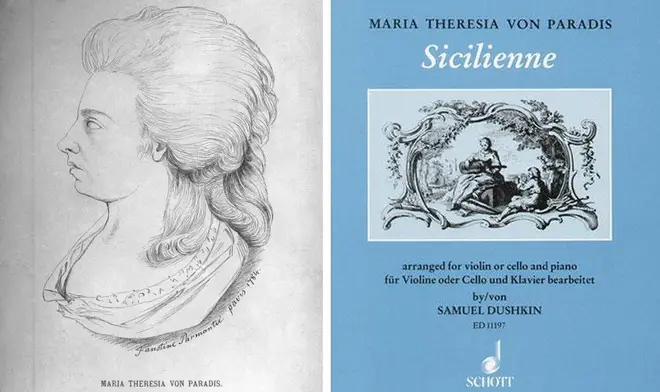The story of Maria Theresia von Paradis, the blind pianist, singer and composer who inspired Mozart
29 October 2020, 14:23

Losing her sight at a young age didn’t prevent Paradis from having an extraordinary career as a singer, pianist and composer.
In 1784, the first school for the blind, the Institute for Blind Youth, was opened in Paris.
The brainchild of French calligraphy professor Valentin Haüy, the school was inspired not by a philanthropist, teacher or writer, but a musician – the blind Austrian pianist and composer, Maria Theresia von Paradis.
Von Paradis had previously shown Haüy a tactile reading and writing method she had created, working in turn with blind German man, Johann-Ludwig Weissenburg. Haüy was inspired enough by this encounter to pursue learning methods and instructions for the blind through raised alphabet systems and dedication through the Paris school and beyond.
But who was this influential Maria Theresia von Paradis who created a groundswell of support for those without sight in Paris in the 18th century?
Read more: Netflix places a statue of Mozart’s sister to celebrate history’s overshadowed women >

Lynn Harrell - Maria Theresia von Paradis - Sicilienne
Who was Maria Theresia von Paradis?
Maria Theresia von Paradis was a pianist, composer and performer who toured Europe in the 17th and 18th centuries.
She was born in Vienna in 1759, the daughter of the imperial secretary in the court of Empress Maria Theresa of Austria – von Paradis’s godmother.
By the age of three, she was completely blind. But her godmother was determined she’d still receive a fine music education. She studied the piano with Leopold Kuzeluch, and singing with Vincenzo Righini.
Pianist, singer, composer and muse
She is known to have been friends with Classical composers Mozart and Salieri, and the former is believed to have written his Piano Concerto No. 18 for the talented pianist. Both are down in the history books as possibly composing for her – as is Haydn.
Von Paradis took her virtuosic piano playing and singing all over Europe, and was also a prolific composer. It was while touring Europe that she met and hung out with none other than French royalty Marie Antionette and English royalty George III.
The Times of London contemporaneously called her ‘the Blind Enchantress’.
Read more: The story of Louise Farrenc is one of the most remarkable in classical music history >

Sheku Kanneh-Mason got a "lovely letter" from Megan and Harry
Maria Theresia von Paradis’s Sicilienne and other works
A ‘Sicilienne’ performed widely by cellists is believed to have been by von Paradis, but scholars aren’t 100 percent sure – it’s one of the pieces Sheku Kanneh-Mason performed beautifully at the Royal Wedding in 2018.
She also wrote solo piano works, vocal pieces and other keyboard music. And she’s penned a series of stage works, including operas, and cantatas.
There are lots of question marks over exactly how many pieces von Paradis actually wrote though.
Why are so many pieces wrongly attributed to von Paradis?
The aforementioned ‘Sicillienne’ was originally penned for violin and piano, but is thought to have been by violinist and composer Samuel Dushkin.
And several of the keyboard works may have actually been ascribed to a Pietro Domenico Paradies – composer and harpsichordist – and wrongly “discovered” as Maria’s work, due to the similarity of the names.
Whatever the truth, she was clearly part of music’s most influential circles, and working at the centre of the Viennese School, one of the most important movements in music history. Sadly, she’s largely forgotten today.
“Paradis’s story has always struck me as intriguing not only because of her talent, but also because we know so little about her, Selina Mills writes in The Spectator.
“Indeed, our girl seems to have stayed on the hillside of history despite her popularity in her day and despite the fact that she was deeply respected by her musical peers.
“We simply don’t know how much of Paradis’s music was printed and shared, and thus known about beyond her own circles, though we have found a few of her youthful compositions, which are very charming.”

The Paradis Files - a short documentary about the making of a new opera
The Paradis Files
Mills is a writer who recently joined forces with composer Errollyn Wallen CBE, director Jenny Sealey MBE and co-writer Nicola Werenowska to produce The Paradis Files, an opera about the life of Maria Theresia von Paradis.
The Paradis Files was commissioned by The Stables and produced by Graeae, a world-leading theatre with D/deaf and disabled actors at its heart.
In a documentary about the opera (watch above), director Jenny Sealey says, “What we will create, is layers and layers and layers of artist aesthetics of accessibility which will mean this is something completely new and maverick – it’s Graeae after all.
“I’m beyond excited about it – and in spite of COVID, I want a group of really eclectic people to do opera like it’s never been done before!”
“The music I write is often eclectic, and in this particular case I’m also trying to capture a sense of the period of history, the 18th century,” composer Wallen says.
Writer and idea creator, Selina Mills, says: “What I really like about it, is we’re not just talking about disability. We’re talking about what it’s like to be an artist and to be a creator, whether it’s in the 18th century or the 21st century.”
Maria Theresia von Paradis died in Vienna in 1824.
Click here to find out more about The Paradis Files. Click here to donate to Graeae’s JustGiving page.









































